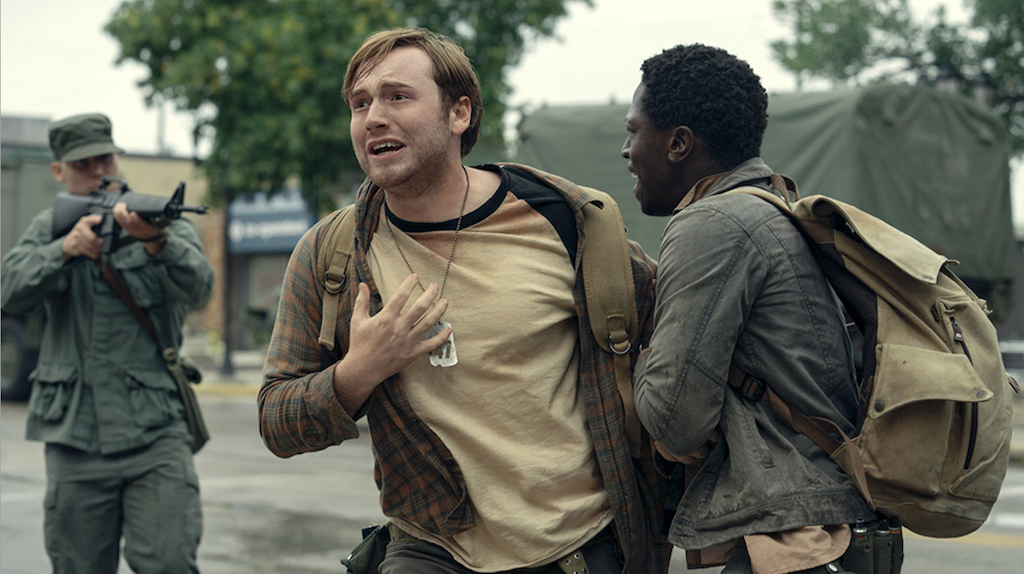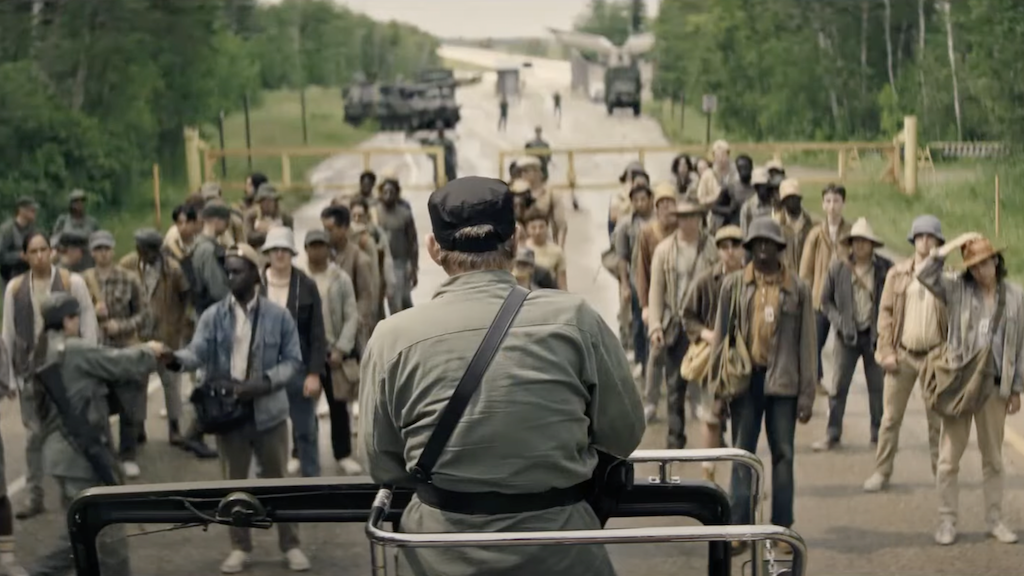The Long Walk Is a Long Slog
Based on a forgotten Stephen King dystopian novel, The Long Walk wants to be an allegory for America’s grindset mania. But unlike other works in this genre, it fails to deliver a bang and instead ends with a whimper.

Still from The Long Walk. (Lionsgate)
In adapting Stephen King’s 1979 novel, The Long Walk, originally published under a pseudonym, the filmmakers made the bold decision to stick relentlessly to the walk itself. The walk is an annual televised public spectacle in an impoverished, bankrupt America following an economically ruinous war. It involves fifty young male contestants who trudge on, hour after hour without a break, with the last one standing declared the winner. He’s given immense wealth as well as one additional wish.
All the others, as they lose their ability to maintain the required pace of three miles per hour, due to leg cramps, injuries, illness, hysteria, escape attempts, and sheer exhaustion, get shot by the armed military men tracking them in tanks through a desolate, depopulated countryside. It’s a dystopian allegory that now seems prescient, in keeping with other bleakly topical hits like Squid Game and The Hunger Games and another upcoming adaptation of King’s novel The Running Man. King himself admits that the “merciless” novel he began at age nineteen, back in 1967, which reflected the wretched realities of his own era during the Vietnam War, got thrown in a drawer where it lay unread for years because it seemed too harsh for the commercial publishing market.
But King’s grueling narrative seems like it ought to be just the ticket for 2025. I imagined the obvious choice in adapting the material would be to go for flashbacks showing how and why each of the desperate main contestants was driven to sign up for this almost certainly fatal trek. It’s an old narrative strategy, especially familiar in film noir, but it’s a good one. See Jules Dassin’s harrowing prison-escape drama Brute Force (1947), for example, or Stanley Kubrick’s heist-gone-wrong masterpiece The Killing (1956), both extremely tense and despairing films.

But The Long Walk foregoes such narrative complexities. And unfortunately, the stripped-down concentration on a few key elements doesn’t help build drama — instead, we get a kind of numbing sameness. The country road, the tanks, the guns, the dwindling number of teenagers as, periodically, somebody falters, gets shot, and drops by the wayside. Sometimes it rains. One time they’re forced to fast-walk uphill, which really culls the herd in a way that’s reminiscent of the forced footrace in the excruciatingly grim neo-noir They Shoot Horses, Don’t They? (1969), which concerns a Depression-era nonstop dance-a-thon. (Some wit wrote a reference to that film in a review of The Long Walk, with the partial headline, “They Shoot Slowpokes, Don’t They?”)
If the characterizations in The Long Walk were sharper and the dialogue more memorable, the minimalist approach just might’ve worked. But the talky male-bonding and tiresome bickering and lame airing of backstories and personal philosophies make those the hardest aspects of the film to endure. A few characters have vaguely mysterious aspects to their personalities and backgrounds, which create brief flickers of interest here and there — a long knife-scar on someone’s face, somebody else hinting at an unusual motive for wanting to win the race, and so on.
Still, it should be noted that there are some talented actors in the cast, particularly the charismatic David Jonsson (Alien: Romulus), who’s genuine star material if he gets the right breaks. He plays the tough, lively Peter McVries, whose friendship with soft, sweet-natured Ray Garraty (Cooper Hoffman, son of the late, lamented Philip Seymour Hoffman) briefly inspires some solidarity among the contestants. It makes you hope a coordinated rebellion in the ranks might develop and lead to a major narrative turn toward the end of Act Two, when the story is really dragging. After all, Ray spouts some vaguely leftist talking points condemning “the system.”
But no such luck. Everyone slogs on into Act Three.
Judy Greer gives a moving performance in a small role as Ray’s anguished mother. She even gets to take part in the one brief flashback in the film, a scene providing Ray’s motivation for participating in the walk.

And Mark Hamill, effectively disguised by aviator sunglasses and a military cap, plays the Major, the harshly jingoistic authoritarian figure presiding over the contest from the top of a tank. He exhorts the young men to display their endurance for the good of country, which he claims is suffering merely from “an epidemic of laziness.” The walk demonstrates an extreme example of the American “work ethic,” he rants, that inspires a yearly uptick in overall national productivity after each contest.
Even with all of the film’s problems, if the screenwriter J. T. Mollner and the director Francis Lawrence (I Am Legend, several Hunger Games) had simply managed to concoct a memorable ending, they might have salvaged a more notable impact. But just when it’s most important to nail down a finale that really packs a punch, they do the worst possible thing: they get all vague and blurry and ambiguous and leave it up to the viewer to decide what really happened and what it all means. A contemptible and stupid choice.
In the original novel, King wrote a more forceful ending that was clearly intended to work as an allegorical indictment of “the system.” It involves the winner of the contest being so shell-shocked and disoriented by the horrors he’s undergone, so alienated from the congratulatory authorities and the crowds celebrating his victory, he can’t even realize that he’s won. He sees only the shadows of imaginary contestants ahead of him still walking and goes slogging onward after them. The world has become one big Long Walk.
That’s definitely not what happens at the end of Mollner and Lawrence’s Long Walk. What exactly does happen, I don’t know. I’m not sure they could tell you. But anticlimactic is far too kind a word for it.